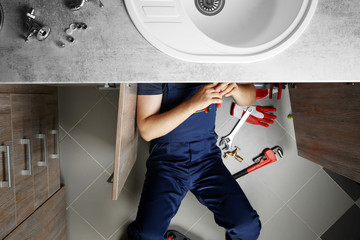Plumbers install, repair and maintain pipes that carry potable water, drainage, irrigation, and sewage. Plumbers ensures that these systems are installed correctly and comply with local laws. Plumbers typically receive their training through an apprenticeship. This combines classroom instruction with paid on-the-job training. It usually takes four to five years.

Plumbing professionals are responsible for various tasks, from installing a new toilet to installing a new sink. This profession requires a high degree of expertise and attention to detail. Licensing laws and inspections often regulate plumbing projects to ensure their safety. While many states are introducing new laws to enforce plumbing codes, older laws may not be up-to-date and can hinder the development of the plumbing industry.
While plumbing is highly specialized, many plumbers choose to work for themselves in the field. This type of job requires extensive classroom and hands-on training. Some plumbers may also choose to work for larger entities. These organizations include municipal buildings, airports, and schools. Some plumbers may even find work in the military. If you have a background in the military, this could be an ideal position for you.
Plumbers install, repair and maintain pipes and plumbing systems that carry water, gas, or other fluids in homes and businesses. They also handle sewage and drainage problems and ensure clean water flow in residential buildings and agricultural irrigation systems. To become a Plumber, you must complete specialized training and several years of apprenticeship under a master plumber or through an apprentice program. It would be best if you were licensed in your state.
A Plumber typically works alone or in a team of professionals. Their duties include traveling to different job sites and performing repairs or maintenance on plumbing systems. Duties include reading blueprints and using tools to determine the best way to solve a plumbing problem. They also need strong critical thinking and troubleshooting skills. They also need good communication and customer service skills. They can work in cramped conditions and use a variety of specialized tools. They also need physical strength to lift and transport heavy equipment.
Plumbing is an essential infrastructure and a vital part of any home or business. Plumbers use advanced tools and techniques to design, install, and maintain water and gas systems in residential and commercial buildings. There are several steps to becoming a plumber, including specialized classes, on-the-job training, and licensing. You can start your career as an apprentice plumber and work your way up to a journeyman and master plumber.
During your apprenticeship, you’ll learn how to use hand and power tools, pipefitting skills, and repair and replace materials in homes. You’ll also learn how to read blueprints and inspect plumbing systems for safety and compliance. Once you’ve completed your apprenticeship, you can apply for a license to practice independently. Licensing requirements vary by state, but most require two to five years of experience and passing an exam that tests your knowledge of local plumbing codes.
Plumbers must be licensed in the city or county where they work. The licensing requirements vary from city to city and depend on local plumbing codes. In some states, additional professional certifications are required. These certifications are a way to demonstrate your proficiency in specific areas of the plumbing industry, which can increase your marketability to potential employers and clients.
For example, National Inspection Testing and Certification (NITC) is an excellent certification if you want to improve your chances of getting hired by a reputable contractor. It can also help you become a more valuable employee and earn a higher pay rate. They have two types of licenses for plumbers: journeyman and master. To become a master plumber, you must pass an exam and have at least two years of experience working under a master plumber. In some cities, continuing education is also required for master plumbers to renew their licenses.
Plumbers install and repair pipes, fixtures, and other equipment that deliver water, drainage, and gas in residential, commercial, and industrial buildings. They are employed by construction companies, plumbing contractors and maintenance departments or may also be self-employed. They must be able to read and interpret blueprints and understand how a project’s plumbing needs fit into the overall goals of the building. They must also work well with others and communicate complex ideas clearly and effectively.
Most plumbers learn their trade through an apprenticeship, which combines classroom instruction with paid on-the-job training. The average program lasts four to five years and includes 2,000 hours of on-the-job training and classroom instruction. In the classroom, apprentices learn safety and local plumbing codes, regulations, and blueprint reading. They also study math and applied physics. Once they have completed their apprenticeship, they can obtain a journeyman plumber’s license.